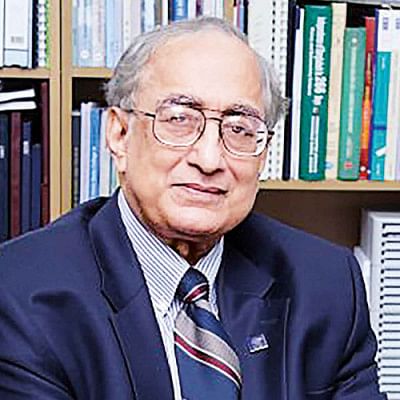An example of brilliance

My classes in BUET began in 1991, and I first met Professor Choudhury in 1995, during the fourth year of my undergraduate studies. He taught our Structural Engineering course. His most impressive features as a teacher were his punctuality and spontaneous mathematical prowess with neat blackboard handwriting. Although I was the first boy, I could never secure good marks in his course. Still, down the line, he relied on me for many important analyses and decision-making related to infrastructural projects. For instance, when cracks were discovered in the Bangabandhu Bridge, Professor Choudhury entrusted me with the task of analysing and later repairing them. Since Professor Choudhury had such in-depth knowledge of engineering, he was able to find simple solutions to complex problems. He was a great source of guidance in any project, be it the Padma Bridge, the Expressway, or any large-scale infrastructural project.
Some of my fondest memories of him were when we went on site visits together. More followed, especially while working with him closely at the Board of Accreditation for Engineering and Technical Education of the Institution of Engineers, Bangladesh. Professor Choudhury was an excellent travel companion. Although he was quite serious in class, he was fun-loving on journeys. We had an age difference of 29 years; yet I never felt disconnected when interacting with him.
His long, stellar career started in around the 1970s after he completed his PhD. I was lucky to have been able to work with him during the latter stages of his career as they were his most mature and rich. After independence, Professor Choudhury and other faculty members helped the BUET Civil Engineering Department grow, almost from nothing. He was able to develop its strength to the point that BUET's recommendations are considered a national point of reference today. Professor Choudhury later became the first vice-chancellor of BRAC University and the vice-chancellor of the University of Asia Pacific. However, he always had a special place in his heart for BUET. He formed the largest engineering alumni association in the country, called BUET Alumni. Today, this network is so strong that it can utilize global knowledge to solve local problems through the expertise and talent of the alumni spread worldwide.
Professor Choudhury was the director of the computer centre in BUET and introduced computerisation when there wasn't even a computer science and engineering department in the country. Early design and analysis computations of massive projects such as the East-West Interconnector, airport hangar complex, and national billing system were accurately performed in the BUET computer centre. While he was an adviser to the Caretaker Government of Bangladesh, he contributed to bringing internet to the country through the VSAT terminal.
Although his career achievements are awe-inspiring, above all, he was a humanitarian. He shared stories about how, during the 1970 Bhola cyclone, he rushed to the affected site with relief and later worked to establish cyclone shelters and concrete houses to help save the people. He lived a simple life and bore unmatched affection and deep empathy for everyone he met.
Dr A.F.M. Saiful Amin is a Professor at the Civil Engineering Department, BUET.

 For all latest news, follow The Daily Star's Google News channel.
For all latest news, follow The Daily Star's Google News channel. 



Comments